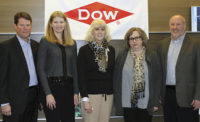An Inside Look at a Custom Contract Manufacturer

MFG Chemical has been in the news a lot over the past several months. In late 2018, the company announced its acquisition of Gulf Bayport Chemicals LP; a multi-million-dollar upgrade investment at its recently acquired Pasadena, Texas, plant; recertification to ISO 9001: 2015 at its Dalton, Georgia, facilities; a new website launch; winning multiple SOCMA Awards for Safety; and new leadership appointments, including the promotion of the EHS&S Director to Vice President of Operations and the hiring of a new Director of EHS&S. In February, MFG announced a new Chief Financial Officer. PCI recently had a discussion with CEO Keith Arnold regarding the company’s activities, what a custom contract manufacturer does, as well as trends and growth in the coatings industry.
PCI: MFG has been in the news a lot in recent months. What’s behind all of the movement?
Arnold: Great things are happening at MFG Chemical. We are upping our game, and it is being noticed. The recently acquired and upgraded Pasadena, Texas, plant, together with our three plants in the Dalton, Georgia, area, give us much more capacity and custom manufacturing capabilities to formulate and manufacture for the paint and coatings industry. Our safety awards, ISO 9001: 2015 recertifications, personnel promotions and newly hired talent are catapulting us into a world-class specialty and custom chemical company. The capital investment and strategic guidance from Platte River Equity is instrumental in making all of this happen.
PCI: What does a custom contract manufacturer do?
Arnold: Custom contract manufacturers work alongside potential or existing customers that need manufacturing that they themselves may be unable to perform for whatever reason (capacity, equipment, safety, etc.). MFG often works alongside customers to fit their formulations into the capacity that we have available. Once a formulation has been decided upon, MFG can reach out to suppliers and leverage our buying advantage as a large consumer of raw materials in order to provide a full turn-key product/program to our customers. Or we can work together to come up with the best economic formula to help the customer be successful in the market.
PCI: How is this different from toll manufacturing?
Arnold: Toll manufacturing occurs when a customer approaches a manufacturer needing simply the service of producing (typically) a simple product; all technology and materials are provided to the toller. In the case of specialty custom contract manufacturing, we are approached and sometimes the technology is provided, sometimes jointly developed and/or refined. Furthermore, we often provide full product stewardship and handle procurement, resulting in a full turn-key program.
PCI: What key chemistries does your company manufacture?
Arnold: Since MFG’s inception one of our key chemistries has been dioctyl sodium sulfosuccinate (DOSS). Additionally, we have expanded to water treatment polymer offerings and many maleic anhydride-based products. In addition, we offer a variety of S/S, glass-lined and Hastelloy® vessels. They are equipped with distillation, condensers, vacuum, high temperature, thin film evaporation and cooling. We also bulk store maleic anhydride and glacial acrylic acid, which are coatings staples. These production and raw material capabilities give us the ability to manufacture water-soluble and solvent-based polymers, amides, rheology modifiers, esters and other surfactants.
PCI: How important is customer confidentiality, and how do you ensure this?
Arnold: Customer confidentiality means everything in the custom contract manufacturing environment. Reputation and trust are two things that when lost, prove difficult if not impossible to gain back. MFG prides itself in having cultivated and maintained lasting relationships with customers and suppliers. To see that confidentiality is always present, we prefer to initiate confidentiality agreements at the beginning of relationships before ever discussing detailed formulations.
PCI: Do you see the coatings industry growing?
Arnold: It depends on the markets within the industry. The paint market is always strong, even in down markets. People will paint even when the economy slows. The market is fairly diverse, with solvent, solventless, low-VOC, thermosetting emulsion, colloidal dispersion, water-soluble coatings, high-solids coatings, two-component systems, powder coatings and radiation-curable coatings. We target the segments that we see as growth areas but also fit our skill set. Colloidal dispersants and water-soluble coatings suit the skill set and reactors that we have.
PCI: What trends are prominent right now in the chemicals market/coatings industry?
Arnold: We think that the markets mentioned, water treatment and coatings are firm and growing. In addition, we see paper, inks and graphic arts headed in the right direction. Also, companies that have a firm presence in the emerging markets seemed to have had a good 2018.
PCI: What are a few of the challenges facing the industry right now?
Arnold: The industry is facing some of the same issues that are confronting the rest of business: the uncertainty of tariffs, how will the UK exit the EU without a major disruption, the question if emerging markets, and much over-reaction by Wall Street to news. The U.S. economy is firm, but that is causing a major strain to find solid employees in a very tight workforce. Everybody is looking for good long-term employees.
PCI: You are on the SOCMA Board of Governors. Does being part of SOCMA play into your participation in the industry as a custom contract chemical manufacturer?
Arnold: We are very involved with SOCMA, and it is vital to our continued growth and success. Our top-flight certification to SOCMA’s EHS&S ChemStewards® is essential to our success and existence. Aside from it being our industry support group, SOCMA provides an assortment of external opportunities for members. Our whole team feels that it is extremely important to support the SOCMA efforts for industry reasons. Yes, we do gain a great benefit from being members, but so does our entire industry. There is no way that we could gain the exposure on Capitol Hill, regulations, project tracking and industry support from any other association for contract manufacturing. We support them and try to become an integral part of the organization and its success. I feel honored to serve on the Board and I am committed to seeing SOCMA have another hundred years of success.
Looking for a reprint of this article?
From high-res PDFs to custom plaques, order your copy today!









